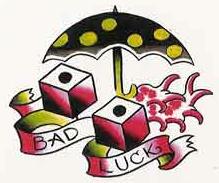Topic: A compendium of menstrual superstitions.
Origins:
On the approach of a woman in this state [menstrual], must will become sour,
So said Pliny in A.D. 77 in his Natural History. Menstruating women have historically been regarded with misgivings and even outright
fear. Many societies barred them not only from being present at important ritual events but even from participation in the most mundane of everyday tasks, especially those related to the gathering or preparation of food. Contact with them was often strictly limited, if not utterly prohibited. In some societies, women were kept completely isolated during their "moon days," even to the point of being kept out of sight until they were deemed fit to return to the company of others.
Much of this suspicion and mistrust had to do with the nature of the process: Roughly every month, otherwise healthy-appearing members of a cultural group began discharging blood from their private parts. Given that the sudden seeping of blood generally signals some form of disaster or misadventure having befallen the person leaking his or her hemoglobin, such process was regarded as ill-omened at best or a certain sign of impending calamity at worst.
Although the connection seems obvious now, it wasn't until the

menstruation. The relation of conception to menses became clearer in 1871 when the belief that a woman menstruated because she failed to conceive was advanced. Physicians had previously wrestled with the question of why women bled from the nether regions on a regular basis, but prior to that time their best guess was it had something to do with the disposal of superfluous blood, possibly to cool a heightened emotional state.
Most societies have since discarded the idea that menstruating women pose a threat to the wellbeing and safety of its members. However, because lore is not easily displaced by advances in knowledge, numerous superstitions and taboos still exist throughout the world regarding such females. Many of these admonishments against performing various acts expound upon a theme of contamination via touch — that such women will either spoil products in the making through having physical contact with them or cause even unremarkable tasks they're part of to not turn out well. These folk beliefs are surprisingly prevalent; chances are you've encountered one or two yourself:
- Hair washed during a gal's period will not hold a curl; it will instead hang limp and ratty.
- Fruits or vegetables canned by a menstruating woman will spoil in the can.
- Visits to the dentist should be put off until after 'the curse' has passed, because fillings put in during this interval will fall out.
- Mayonnaise a menstruating woman has a hand in producing will not come together; it will instead curdle.
- Touching fruit trees during this time is prohibited because such contact will spoil the fruit even as it hangs on the tree.
- A gal experiencing 'a visit from Aunt Flo' should avoid going near wineries, lest her presence turn the wine into vinegar.
- Breadmaking will fail because the dough will refuse to rise.
- A girl enduring 'the scourge of Eve' mustn't be allowed to take a turn at the butter churn because the butter will not "come," that is, not form into a solid mass.
- Any jam or jelly a woman attempts to make at 'that time of the month' will fail to set.
- Hams hung to cure must not be touched by a woman during catamenia lest contact with her cause them to spoil.
- During her monthlies, a gal must not butcher meat lest she cause it to rot.
Additional taboos attempt to limit the activities of menstruating women:
- A gal experiencing her monthlies should not engage in sexual activity. (Actually, there is no harm it for either party involved, and there is some reason to conclude that for at least some women their orgasms will lessen their menstrual cramps.)
- A woman should not bathe or go swimming during Aunt Flo's visit. (This one likely springs from a fear of contamination via menstrual blood's being transmitted to the water where others are paddling or bathing.)
- A menstruating female should also be barred from joining any hunting party lest her presence scare off the game. (In theory, prey animals will scent her blood, which will send them scurrying. Were this the case, the deodorants, soaps, and detergents used by any of the expedition's members would probably have long since put the wind up the tails of the hunted.)
Not all associations with menstrual blood are negative. Because blood in any context is viewed in the realm of folk belief as a bodily fluid enjoying strong ties to passion, courage, and indeed life and death, some of those links translate to the blood produced by catamenia. Ancient cures used it to treat lepers and those afflicted with hydrophobia (rabies). Some early healers insisted it could cure gout, goiter, hemorrhoids, epilepsy, worms, and headaches.
It was also viewed as a potent ingredient to add to a love potion or to slip directly into something that would be ingested by the
Menstrual blood was viewed as possessing powerful medicinal qualities by some primitive tribes. The apron worn by a young girl during her first menstrual period was highly coveted by relatives who were anxious to wear it themselves, certain it would ensure good health. Other tribes believed merely touching a drop of menstrual blood could relieve severe pain and bring about success and wealth.
Barbara "rub of the green red" Mikkelson
Last updated: 14 June 2005
 Sources:
Sources:
